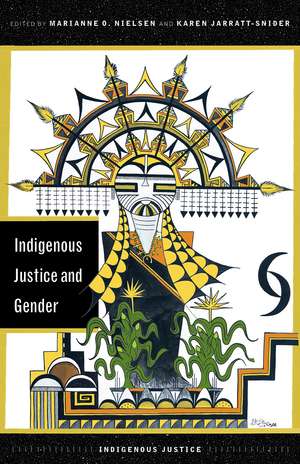Indigenous Justice and Gender: Indigenous Justice
Editat de Marianne O. Nielsen, Karen Jarratt-Snideren Paperback – 2 mai 2023
The book centers the concept of “rematriation”—the concerted effort to place power, peace, and decision making back into the female space, land, body, and sovereignty—as a decolonial practice to combat injustice. Chapters include such topics as reproductive health, diabetes, missing and murdered Indigenous women, Indigenous women in the academy, and Indigenous women and food sovereignty.
As part of the Indigenous Justice series, this book provides an overview of the topic, geared toward undergraduate and graduate classes.
Contributors
Alisse Ali-Joseph
Michèle Companion
Mary Jo Tippeconnic Fox
Brooke de Heer
Lomayumtewa K. Ishii
Karen Jarratt-Snider
Lynn C. Jones
Anne Luna-Gordinier
Kelly McCue
Marianne O. Nielsen
Linda M. Robyn
Melinda S. Smith
Jamie Wilson
Preț: 269.94 lei
Nou
Puncte Express: 405
Preț estimativ în valută:
51.65€ • 55.23$ • 43.07£
51.65€ • 55.23$ • 43.07£
Carte disponibilă
Livrare economică 27 martie-10 aprilie
Preluare comenzi: 021 569.72.76
Specificații
ISBN-13: 9780816549696
ISBN-10: 0816549699
Pagini: 200
Ilustrații: 3 tables
Dimensiuni: 140 x 216 x 15 mm
Greutate: 0.25 kg
Editura: University of Arizona Press
Colecția University of Arizona Press
Seria Indigenous Justice
ISBN-10: 0816549699
Pagini: 200
Ilustrații: 3 tables
Dimensiuni: 140 x 216 x 15 mm
Greutate: 0.25 kg
Editura: University of Arizona Press
Colecția University of Arizona Press
Seria Indigenous Justice
Notă biografică
Marianne O. Nielsen is a professor emeritus in the Department of Criminology and Criminal Justice at Northern Arizona University.
Karen Jarratt-Snider is a professor in the Department of Applied Indigenous Studies at Northern Arizona University.
Karen Jarratt-Snider is a professor in the Department of Applied Indigenous Studies at Northern Arizona University.
Recenzii
“Thirteen scholars affiliated with the Native American studies programs at the University of Arizona and Northern Arizona University pen seven short essays summarizing critical issues both Native American women and two-spirit people face. Each chapter includes examples of women who have worked together pragmatically and through academic research to successfully overcome challenges such as sex trafficking, health disparities, domestic violence and murder on reservations, and food insufficiency. These accounts are very impressive, but there is still much work to be done to advance gender justice.”—N. J. Parezo, CHOICE connect
“The critical writings by scholars expertly connect historical injustices to today’s injustices against Indigenous women and LGBTQ communities and [reveal] how Indigenous critical resiliency of culture and tradition is the strength of community.”—Aresta Tsosie-Paddock, University of Arizona
“This book centers the resilience and power of Indigenous women and two-spirit people. From various perspectives rooted in the sacredness of female empowerment, the authors highlight the connection between rematriation and Indigenous well-being. This collection of work honors and privileges the vitality of Indigenous women and two-spirit people while critiquing the brutal impact of settler colonialism. This book will be valuable across disciplines/spaces that engage in social justice work, especially as it pertains to BIPOC, health, policy, gender studies, and restitution.”—Leola Tsinnajinnie Paquin, University of New Mexico
“The diversity of issues in this book provides readers with a glimpse into the complexity of gender and Indigenous justice. For readers, the book provides perspectives rooted in traditional approaches to gendered healthcare and social wellness. It provides valuable introductions to how colonization has impacted the status, well-being, and safety of Indigenous women and girls and invites readers to learn more.”—Cheryl Crazy Bull, Tribal College Journal
“The critical writings by scholars expertly connect historical injustices to today’s injustices against Indigenous women and LGBTQ communities and [reveal] how Indigenous critical resiliency of culture and tradition is the strength of community.”—Aresta Tsosie-Paddock, University of Arizona
“This book centers the resilience and power of Indigenous women and two-spirit people. From various perspectives rooted in the sacredness of female empowerment, the authors highlight the connection between rematriation and Indigenous well-being. This collection of work honors and privileges the vitality of Indigenous women and two-spirit people while critiquing the brutal impact of settler colonialism. This book will be valuable across disciplines/spaces that engage in social justice work, especially as it pertains to BIPOC, health, policy, gender studies, and restitution.”—Leola Tsinnajinnie Paquin, University of New Mexico
“The diversity of issues in this book provides readers with a glimpse into the complexity of gender and Indigenous justice. For readers, the book provides perspectives rooted in traditional approaches to gendered healthcare and social wellness. It provides valuable introductions to how colonization has impacted the status, well-being, and safety of Indigenous women and girls and invites readers to learn more.”—Cheryl Crazy Bull, Tribal College Journal
Descriere
This new book offers a broad overview of topics pertaining to gender-related health, violence, and healing. Employing a strength-based approach (as opposed to a deficit model), the chapters address the resiliency of Indigenous women and two-spirit people in the face of colonial violence and structural racism.


